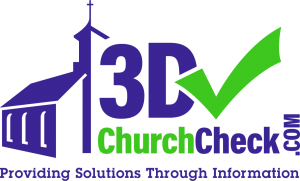Crucial Changes in the Background Screening Industry
It is the foremost desire of 3D Church Check to obtain for our clients the most accurate and up-to-date information possible pertaining to county, state and multi-state criminal background public record searches. It is important to understand that the use of proprietary databases in our multi-state searches cannot be construed as the definitive work of a fail-safe system. The following information provides our clients with important facts about the advantages and inherent challenges to database searches, as well as the 3-D approach to accurate screenings.
Advantages to Databases
Databases have distinct advantages over conventional search formats by:
- Saving time: databases are virtually instantaneous.
- Saving expense: county-by-county or state-by-state searches can be
very costly. - Geographic coverage: throwing out a wide net may provide information that could never have been discovered by a local state or county check alone.
According to industry experts, a complete background screening must include the information that would come from these multi-state database searches.
3D Church Check believes that the proper utilization of this important screening tool is the first step in obtaining the most accurate and comprehensive background search available.
Inherent Challenges with Databases
Databases may have incomplete information for the following reasons:
- Not all statewide repositories contain complete records from all counties in the state.
- Records may be incomplete or lack sufficient detail about the offense.
- Some databases contain only felonies or contain only offenses where a state corrections unit was involved.
- Databases are only as good as the information entered into them.
- Records in a central repository are always stale to some extent. First, there is the lag time before the reporting agencies [county courts] submit the data. Then the statewide repository may only enter new data at intervals. Some states, for example, only update information quarterly, semi-annually or annually. This means that the most current offenses are the ones least likely to appear in a search of statewide databases.
Changes in Conventional Searches
Prior to 2002, conventional searches were done in part with the use of SSNs. Since that time, because of identity theft, SSNs are no longer used — therefore, multiple names are not always returned on a single search. Our databases operate on this principle: searches are conducted on a single name only and a date of birth. This information must be exact to return the proper results.
1-2-3 Means a SECURE, SIMPLE, and FAST Process

